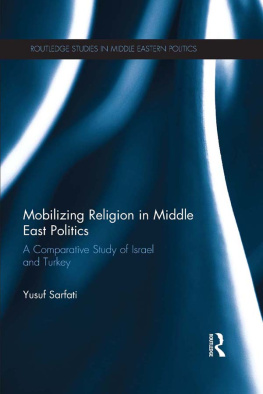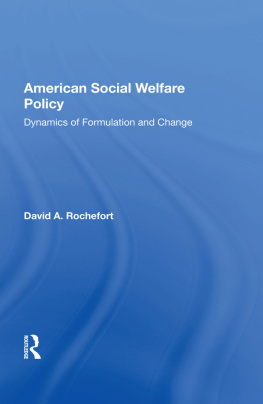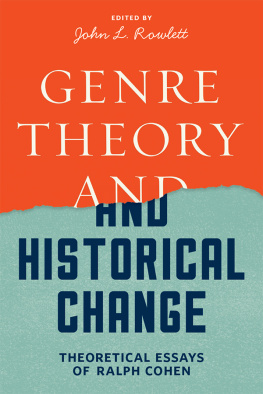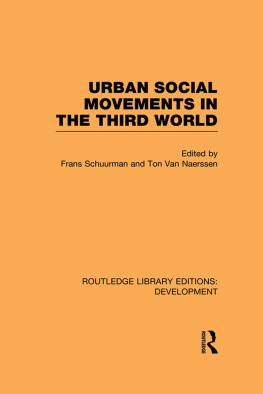First published 1985 by Westview Press, Inc.
Published 2018 by Routledge
52 Vanderbilt Avenue, New York, NY 10017
2 Park Square, Milton Park, Abingdon, Oxon OX14 4RN
Routledge is an imprint of the Taylor & Francis Group, an informa business
Copyright 1985 Taylor & Francis
All rights reserved. No part of this book may be reprinted or reproduced or utilised in any form or by any electronic, mechanical, or other means, now known or hereafter invented, including photocopying and recording, or in any information storage or retrieval system, without permission in writing from the publishers.
Notice:
Product or corporate names may be trademarks or registered trademarks, and are used only for identification and explanation without intent to infringe.
Library of Congress Cataloging in Publication Data
Main entry under title: Comparative social dynamics.
Bibliography: p.
1. Social changeAddresses, essays, lectures. 2. Civilization, ModernAddresses, essays, lectures. 3. IsraelSocial conditionsAddresses, essays, lectures. 4. SociologyAddresses, essays, lectures. 5. Ethnology Addresses, essays, lectures. I. Eisenstadt, S. N. (Shmuel Noah), 1923- . II. Cohen, Erik. III. Lissak, Moshe, 1928- . IV. Almagor, Uri.
HM101.C675 1985 303.4 84-15190
ISBN 13: 978-0-367-01489-6 (hbk)
It is our pleasure to present this volume to Shmuel N. Eisenstadt, on the occasion of his sixtieth birthday, in recognition of his contribution to sociology. Although the volume was conceived and organized by a group of Eisenstadt's ex-students and present colleagues at the Department of Sociology and Social Anthropology of the Hebrew University of Jerusalem, the contributors come from many subdisciplines and from a variety of academic affiliations around the world. They are representative of both Eisenstadt's exceptionally varied interests and his wide-ranging network of personal ties with friends and colleagues. We took great care to contact as many of these people as possible and received positive responses from most, but it was obviously not possible to include them all in a single volume. We apologize to those not represented here.
Instead of being a random collection of unrelated papers, common in the genre of Festschriften, this volume is a well-organized work that although related to Eisenstadt's main intellectual concerns, should stand on its own. Considering, however, the versatility and vast scope of Eisenstadt's work, which touches many major fields of sociology and embraces a wide range of cultures and historical periods, it was by no means easy to find a central theme that would endow our Festschrift with direction and cohesion. Whatever their particular focus, most of Eisenstadt's publications refer in one way or another to the comparative study of social dynamics, and so we chose that as the leading concept of our book. Within this very broad theme we concentrated on several major areas of sociological research that reflect some of Eisenstadt's principal interests as well as the specific concerns of the contributors. We divided the papers, all of which are original contributions prepared specifically for this volume, into five parts.
Part 1, "Process and Change in Tribal and Historical Societies," relates to one of Eisenstadt's earliest interests, which began even as he was a student of history and came to fruition in his major work, The Political Systems of Empires (), is also reflected in some of the contributions to Part 1.
Part 2, "Modernization," relates to an interest that preoccupied Eisenstadt mostly during the middle part of his career, an interest that found its major expression in such works as Modernization: Protest and Change (). The contributors to this part, while on the whole not taking direct issue with Eisenstadt's ideas, deal with several topics closely related to his concerns.
Part 3, "Sociology of Science," relates to one of Eisenstadt's most recent interests, the sociology of knowledgeitself an outgrowth of his concern with the dynamics of civilizations and the impact of their world view on the social structuring of universes of knowledge. The contributions in this part come from two of his close colleagues in Israel, both of whom specialize in the sociology of knowledge and science.
Part 4, "Israeli Society," relates to a concern that has occupied Eisenstadt as an Israeli citizen and as an academic from his youth and throughout his career, from his first book, The Absorption of Immigrants (), and up to his most recent work, The Transformation of Israeli Society (in press). The contributors to Part 4, almost all Israelis, deal with a variety of topics generally related to the process of social change in Israeli society.
Part 5, "Sociological and Anthropological Theory," relates to Eisen-stadt's most encompassing concern, which is reflected in much of his work, especially in his books Social Differentiation and Stratification (). Some of the papers in this part take up and discuss a central theme of Eisenstadt's theoretical work; others express the various current theoretical concerns of the contributors themselves.
Although they may touch upon one or another of Eisenstadt's principal interests, not all of the contributors relate their work directly to Eisenstadt's. Of those who do, a few build on or expand his ideas; others, however, are critical of some of his work, pointing out insufficiencies or unexplored potentialities. It is this critical but explorative attitude one we who have been his students learned from himthe effort to further develop, modify, and eventually transcend his ideas, that to our minds is the most worthy tribute his friends, students, and colleagues can offer this great scholar.
Professor Edward Shils, Eisenstadt's one-time teacher and later close friend, graciously consented to contribute a written account of his appreciation of Eisenstadt as a person and as a scholar. It is not and was not intended to be a biography or an examination of Eisenstadt's position in the history of sociology; rather, it is a very personal memoir written by one who has been on intimate terms with Eisenstadt for nearly forty years.









